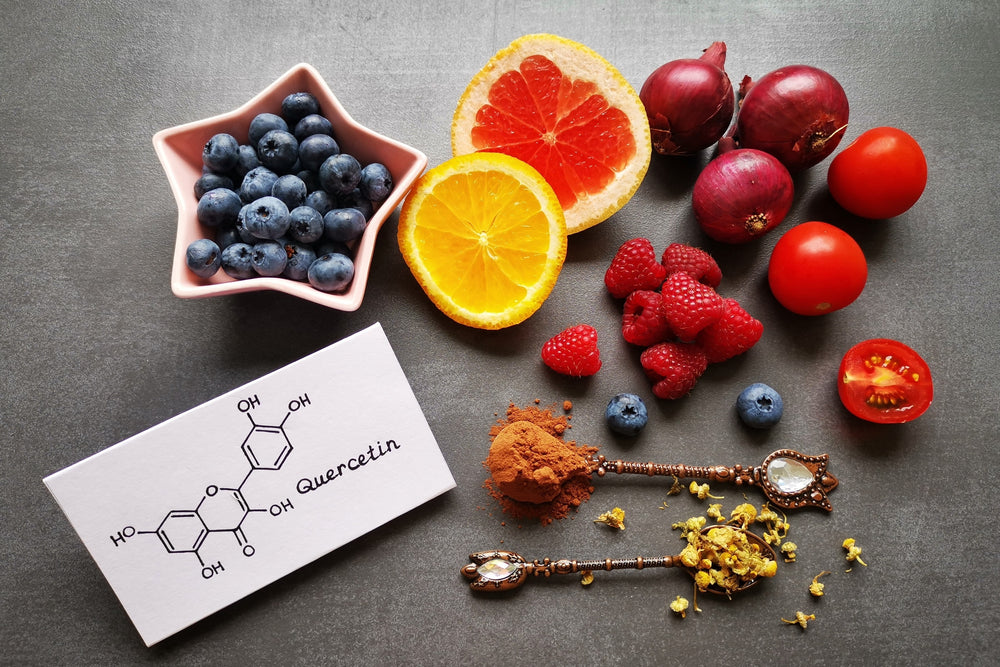By: Kayla Kowalski, Certified Canine Nutritionist
Our environment is full of irritants that can cause humans and pets to suffer from allergies. For us, that can look like itchy eyes, constant sneezing, and an annoying runny nose. For our pups, it can manifest as itchy skin, itchy paws, upset stomachs, or ear infections. What's worse, with the increased use of chemicals — such as herbicides, pesticides, and fertilizers — the prevalence of environmental allergens only seems to be increasing.
Identifying the source of allergic reactions and preventing secondary infections is the key to long-term management. By reducing the need for clumsy plastic cones and prescriptions of systemic steroids and antibiotics, quercetin has been shown to help ditch the itch.

Is Quercetin Safe For Dogs?
Quercetin is a type of flavonoid – a naturally occurring plant pigment that gives fruits and vegetables vibrant colors. Its natural anti-inflammatory, antioxidant, and antihistamine properties have earned the compound its nickname, "nature's Benadryl."
Quercetin has been studied and proven to treat allergies in dogs and is considered a safe dog supplement. At higher than recommended doses, mild stomach upset has occasionally been reported, but most side effects can be treated or prevented with proper dosing.
Side Effects of Quercetin for Dogs
Side effects of quercetin are generally minor. Some pup parents reported their dogs exhibited signs of nausea or loss of appetite when given quercetin on an empty stomach. If your pup shows these signs, try giving them their daily dose with their meals.
Some dogs may feel nauseous or have a reduced appetite when quercetin is given on an empty stomach. If you notice your pet experiences any of these symptoms while taking this supplement, give it with your dog’s meals.
Additionally, if your pup is on any prescription medications that are metabolized through the P450 pathway, talk to your vet before introducing quercetin to your dog’s daily allergy regimen. Your DVM may recommend an alternative to quercetin or alter your pup’s prescription dose.
Quercetin Helps Fight Dog Allergies
Think of quercetin as nature's antihistamine and your pup's new allergy-relieving friend. It helps relieve those pesky late-night licking sessions and constant scratching.
During an allergy attack, your dog’s body produces an immune response by setting off a chain of reactions and releasing chemicals, including histamine. Histamine release causes the break out of redness, irritation, and inflammation, which we see over the body.
Now, how does quercetin help? Quercetin contains natural antihistamines, which turn off this production line and block histamine release. Less histamine means less inflammation, and — you guessed it —less inflammation means less troublesome itching.
Alongside these anti-inflammatory properties, quercetin has also been seen to act as a potent antioxidant. This means it can mop up harmful free radicals and prevent cell damage. It's even been studied for its uses in preventing the replication of cancer cells. This protective action makes quercetin a powerhouse for total body health!
Quercetin Dosage Instructions
As with adding anything new to our dog's diet, knowing how much your pup should be getting is essential. Giving your dog 50-100mg per 10 pounds of body weight is a simple way to calculate a dose range for quercetin.
For example, a 20-pound pup could be given between 100 and 200mg of quercetin daily. An 80-pound dog could receive anywhere between 400 and 800 mg daily.
For best results, I recommend splitting your dog's calculated dose into two portions, one-half each in the morning and at night. You can add the capsule whole to their meal, or for picky pups, the capsules can be opened and sprinkled into their dog food.
Where to Find Quercetin
Fruits and Veggies
Quercetin is a naturally occurring flavonoid and can be directly sourced by including fruits and vegetables in your pup's diet. Some high-potency examples include:
- Apples (make sure to include the skin)
- Berries (such as blueberries, blackberries, raspberries, and cranberries)
- Leafy green vegetables (like kale and spinach)
- Broccoli
Please note: onions and grapes are also known to be high in quercetin, but are toxic to dogs and should never be given.
Supplements
When searching for a quercetin supplement, it's always best to source products free of additives, fillers, and sweeteners.
You may notice that some quercetin supplements have added bromelain. Bromelain is a protein-digesting enzyme naturally found in pineapple that assists the absorption of quercetin and boosts its anti-inflammatory effects by stopping the release of histamine.
Try pairing quercetin with an allergy supplement that contains further allergy-fighting and immune-boosting ingredients like spirulina, colostrum, and probiotics. Additionally, Omega-3 fatty acids can promote healthy skin and coat, which may relieve some itchiness, and Vitamin C can provide an additional immune system boost to support your dog’s overall health.

Try “Nature’s Benadryl” to Soothe Your Dog’s Allergies
With a growing portion of pups encountering allergy concerns, controlling itchiness and other allergic responses has never been more of a priority in pet parents' minds. Whether your pup suffers from seasonal allergies, food allergies, or atopic dermatitis, "nature's Benadryl" might help alleviate some of your dog’s allergy symptoms.
You might also find our other articles on dog allergies helpful. Check out our guide to natural remedies for allergy treatment, and learn more about allergy testing to see if it’s right for your pup.


